Samsung Galaxy Nexus & Ice Cream Sandwich Review
by Brian Klug & Anand Lal Shimpi on January 18, 2012 1:34 PM ESTBattery life remains the other big axis on which smartphones are judged, and here we've turned to our regular 2011 suite of battery life tests to see how the Galaxy Nexus shakes out. Our battery life testing consists of a page loading suite which loads through a few dozen pages endlessly on both WiFi and cellular data until the phone dies, with the display set at 200 nits. For the cellular tests, we're always careful to test in cellular environments with decent signal (at least -75 dBm or higher) as well, since that's a factor. Next is a simple call test where we play music at both ends of a call until the device under test dies, and our final test is a WiFi hotspot workload which consists of four page loading tabs and a 128 kbps streaming MP3 station that runs until the phone dies.
First up are the web browsing tests over cellular 3G; this means EVDO Rev.A for the CDMA/LTE version, and WCDMA T-Mobile for the GSM/UMTS device.
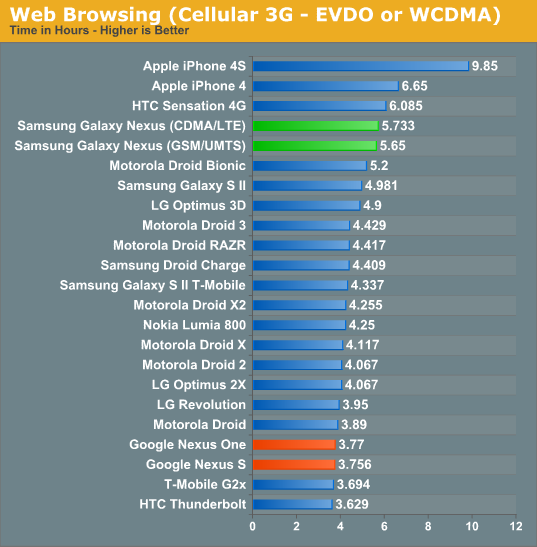
The Galaxy Nexii both do surprisingly well. I'm actually very impressed with how long the devices lasted subjectively on 3G and this definitely backs that up. Of course, both devices include beefy batteries, but Samsung has done a nice job thus far including big batteries without making devices bulky or heavy.
Next up is the same test, but on 4G LTE for the CDMA/LTE variant.
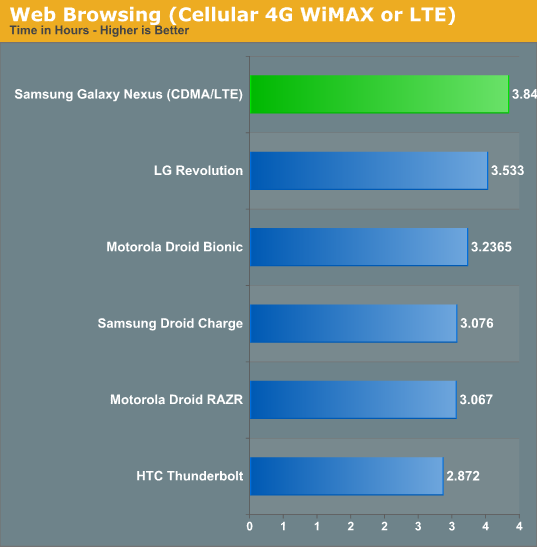
The Galaxy Nexus doesn't post numbers very far in front, but manages to come in the top of the pack on 4G LTE at just under 4 hours. This is a pretty impressive result, honestly, considering that CMC221 is likely made on the same 45nm manufacturing process as CMC220. Again, I'm impressed with the Galaxy Nexus' longevity even on 4G LTE.
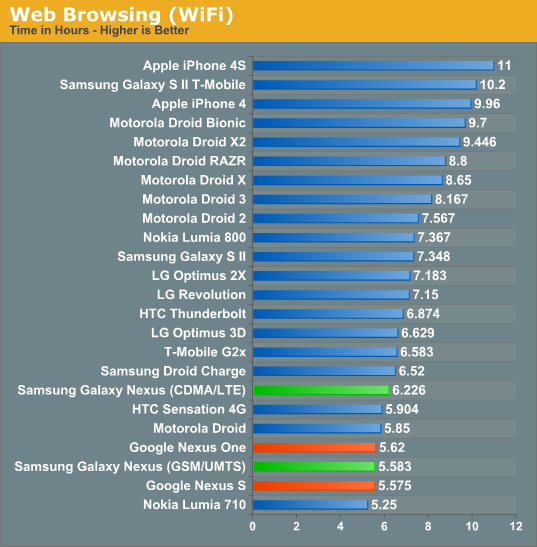
Surprisingly, the Galaxy Nexus can't break past that 6 hour mark even on WiFi, however, which does lead me to think we might be constrained by driving that display.
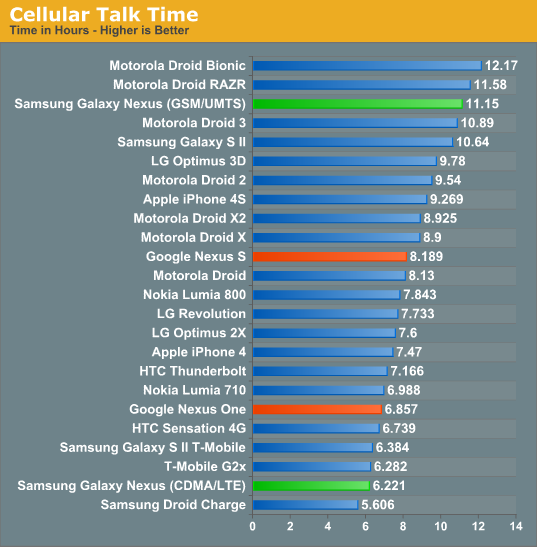
If you ever wanted to see how much difference having a different cellular architecture makes, see above. The GSM/UMTS Galaxy Nexus lasts impressively long on a voice call, at over 11 hours, yet its CDMA/LTE brother lasts just over half that.
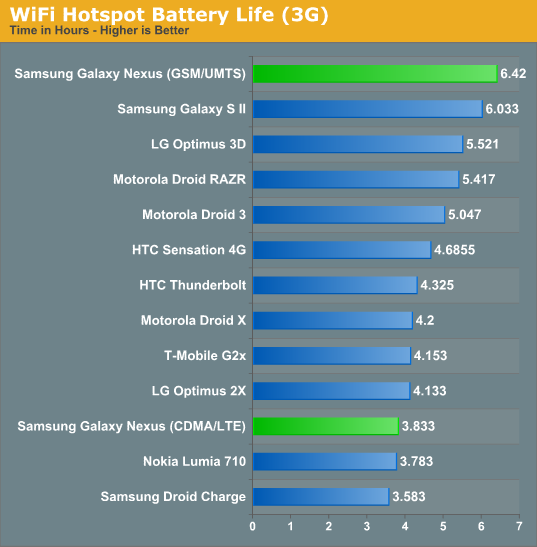
WiFi hotspot on 3G tells the same story - I'm not sure what Via Telecom's CBP7.1 draws in its active state for EVDO or 1x voice, but it seems to eat up more power than the XMM 6260 (X-Gold 626) in the GSM/UMTS Galaxy Nexus.
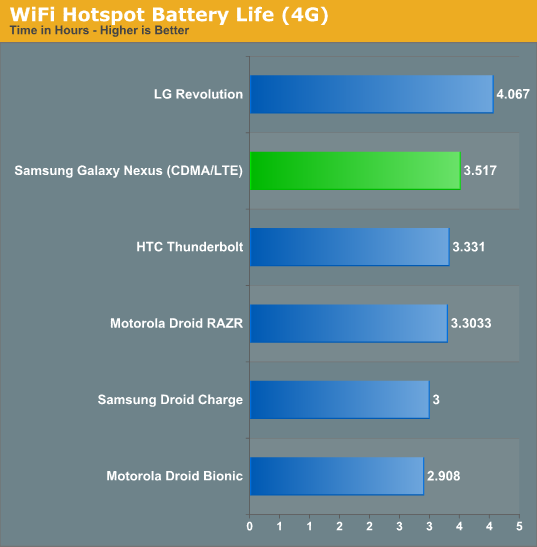
As a 4G LTE WiFi hotspot, the Galaxy Nexus loses its edge over the Revolution, but does come in just ahead of the rest of the 4G LTE herd.
The story of battery life on the Galaxy Nexus unsurprisingly depends on which variant you're talking about. For a phone with a 4.65" display, I'd say I'm impressed with the battery life on both devices - remember that the area that needs to get lit up goes as r^2 - increasing that and not killing the battery is a big feat. In addition, I'd wager that using the OpenGL ES renderpath (and accelerated browser in 4.0) definitely helped both Galaxy Nexus devices post impressive scores. As for the two variants, the GSM/UMTS device has impressively long battery life pretty much across the board. Playing with that phone, I was rarely wanting for more on my regular use schedule (I charge at night on my nightstand). We've seen XMM6260 before in numerous devices where it seems to be a pretty good citizen.
The CDMA/LTE variant, on the other hand, depends strongly on what air interface you end up using most - on 4G LTE the device comes in at the front of the pack usually, and its 3G web browsing test is above average. However, if you make a lot of voice calls, the phone might not cut it. Unsurprisingly the CDMA/LTE Galaxy Nexus does nothing to dramatically change 4G LTE battery life - for that we're still waiting for upcoming 28nm LTE basebands.










185 Comments
View All Comments
StormyParis - Wednesday, January 18, 2012 - link
Android should use the tried and true method of siplaying a *screenshot* of the home page as soon as the home button is pressed, and then replacing it with the live version. Btton presses are indeed way too laggy.CoryS - Wednesday, January 18, 2012 - link
I feel it is worth mentioning that custom kernels, combined with 4.03 have completely removed the task switcher lag. The latest version of Francos Kernel has increased idle battery life by an incredible margin (I lose about 1% every 10 hours on idle) and it has removed all UI lag I noticed on the stock device.dwang - Wednesday, January 18, 2012 - link
+1My gn is buttery smooth with 4.0.3 bigxie ROM and franco kernel.
Best phone I've ever used and I've owned every nexus phone (nexus one, nexus s) and the g1.
bjacobson - Wednesday, January 18, 2012 - link
this is why people go to Apple, because Google, even on their flagship phone, can't make it out better than the modding community.dwang - Wednesday, January 18, 2012 - link
what exactly are you babbling about. 4.0.3 is responsible for most of the performance improvements and thats from google.phantomash - Thursday, January 19, 2012 - link
If Apple did such a good job on iOS then why is there the term "jailbreak"?doobydoo - Thursday, January 19, 2012 - link
For the minority of users who want to use a different OS to iOS?A number, which you should take note, is far lower than the percentage of Android users who want to 'root' their phone (the equivalent).
Tetracycloide - Thursday, January 19, 2012 - link
Of course it's far lower, the people that want to customize like that avoid Apple because it's not as customization. It's an intellectually dishonest self-fulfilling statement that demonstrates absolutely nothing.Blackened144 - Thursday, January 19, 2012 - link
That goes both ways.. If Google did such a good job on Android, why is there the term "root"?Tetracycloide - Thursday, January 19, 2012 - link
Your response to a post highlighting the strengths of a partially open platform vis a vis third party kernel development is that that is the reason people go with a completely closed platform? That makes no sense at all...